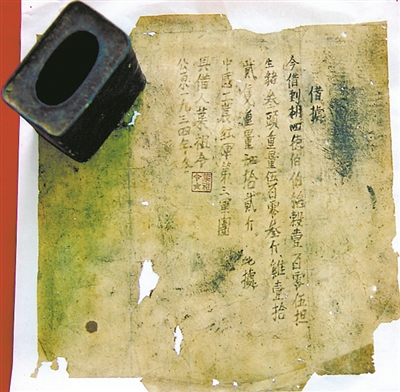In May of 1997, villager Hu Yunhai received a payment of 15,000 yuan ($1,809) from the local government. Hu said at the time that he never imagined that he could receive the money because the IOU letter was signed more than 60 years before. The original loan took place before the founding of the government of the People's Republic of China in October 1949, but the history of the IOU letter was tied up with the formation of the new country. This article unravels the mystery and touching story behind this IOU letter, and how the village and the birth of the nation intertwined.

File photo: Agencies
An IOU hidden in the wall
In the spring of 1996, Hu Yunhai, who lived in Guanheng village in Central China’s Hunan Province, found a black rusty casket inside a hole in the wall when he was renovating his kitchen. Inside the casket was a deckle-edged paper. The paper turned out to be an IOU letter between his grandfather Hu Side and Ye Zuling.
According to the letter, Ye borrowed 5,250 kilograms of rice, 3 pigs and 12 chickens from Hu Side. At the end of the letter, Ye signed himself as representing the Third Corps of the Red Army.
Who is Ye Zuling and where is he now, Hu Yunhai wondered. Later he reported it to the local government and soon got reply that Ye was then quartermaster of the Third Corps of the Red Army and he had died at the age of 28 in December 1934 during the Long March.
The worn letter revealed a story that took place long before the founding of the new China.
Camaraderie during Chinese revolution
Ye arrived at Guanheng village along with his troops one month before his death. Villagers thought that the Red Army was not different from warlords who used to loot and ransack people's houses. So villagers chose to hide in the forest.
But the Red Army had not occupied their houses or asked them for food, even with an already scant food supply.
Hu Side, who had been observing the Red Army secretly, decided that it was safe to go back to their village and proposed that the villagers should give some food to those righteous soldiers. Villagers approved the proposal.
Before departure, the quartermaster Ye said to Hu Side that they would never forget the food offered by the villagers, but given the tough situation facing them, they had to write an IOU letter, adding that villagers could ask the new people's government for repayment after winning the revolution.
The letter was later hidden in the wall of Hu's kitchen because of war, and remained forgotten since then.
Prosperity brought to everyone
Upon receiving the repayment, Hu Yunhai decided to donate it to revamp a local primary school, as the original food was originally collected from all the villagers. In hopes of providing better school for children in his village, he said the money should be used to foster more talent for the country.
Nowadays, the primary school has transformed into a kindergarten.
Guanheng village's average annual income was less than 1,000 yuan back in 1996 when the IOU was discovered, but in 2008, the village lifted itself out of the poverty via targeted poverty-alleviation policies. By 2020, the average annual income in the village reached 16,000 yuan.

